October 31, 2003
Robust GDP Growth Might Signal a Real Economic Recovery, But Consumer Spending Slips
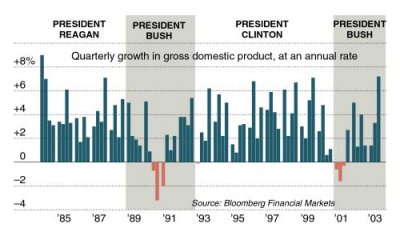
The nation’s economy spiked in the past several weeks, more robustly so than in years! Here're a few URLs to check out:
- Economy Reports Speediest Growth Since the Mid-80's
- Consumer Spending Slips
Whether or not there'll be any JOBS growing out of this is anybody's guess.
- Arik
October 30, 2003
Is Sony Broken…? 20,000 Jobs Lost is One Indicator

Browsing around this morning, I noticed on the BBC Web site from a couple of days ago an article describing how Sony is being forced to partner with Plasma/LCD-TV competitor Samsung in order to try and recover in an important (and eminently profitable) market that Sony has found itself losing ground in. Likewise, DVD Recorder shipments have suffered at the hands of Matsushita’s Panasonic, who boosted profits 73% in the same quarter Sony’s profits dropped 25%. As a result, some 13% of Sony’s worldwide workforce will be cut over the next three years to try and restructure the company for a future less certain in its reliance on the quintessential consumer electronics brand.
Chief Executive Nobuyuki Idei said last month that Sony was "lacking a sense of urgency". Sony has perhaps gotten too comfortable and complacent – an all-too-familiar story seen countless times with once-high-flying market leaders – trying to sell more of what Sony innovates, rather than what their customers really want to buy. Certainly, Sony’s key challenger these days – Samsung – has such an urgency at work in its enterprise, impacting the marketplace to Sony’s detriment time and time again in multiple sectors – from cell phones to televisions. Other rivals have presented themselves – such as LG – that have overcome Sony’s previous brand image in so many markets – that is, when you choose Sony, you get the best-quality product money can buy. Lower cost competitors have risen to meet that quality bar and in the minds of Sony’s customers, their pricing power (and profitability) has been eroding ever since.
- Arik
October 29, 2003
College Football, Bowl Championships & Anti-Trust: Mid-Size Division I Schools Take It to Capitol Hill
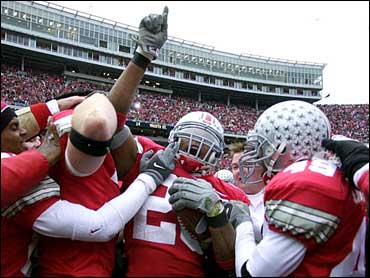
The Buckeyes of Ohio State were Last Season's Champs
 Tulane University president Scott Cowen went to Capitol Hill today to testify before the Senate Judiciary Committee on the allegedly unfair and anticompetitive restrictions and exclusions of the Bowl Championship Series, or BCS, used to determine which Division I football teams compete in postseason collegiate bowl games and ultimately determine the national champion.
Tulane University president Scott Cowen went to Capitol Hill today to testify before the Senate Judiciary Committee on the allegedly unfair and anticompetitive restrictions and exclusions of the Bowl Championship Series, or BCS, used to determine which Division I football teams compete in postseason collegiate bowl games and ultimately determine the national champion.
Cowen hopes to replace the system when it is scheduled to expire in 2005, but whether the BCS should be the subject of an antitrust action is up for debate. While it’s true that to automatically qualify for an elite BCS bowl game, a team must finish in the top six in the BCS rankings, and in the top 12 just to be eligible, the BCS actually expanded, rather than inhibiting, competition – which will prove to be a key question in federal antitrust legal action. The process certainly favors the nation's six powerhouse football conferences plus Notre Dame, leaving most mid-major teams to fight through and maintain undefeated status to earn even a glimmer of hope at qualifying. And, in a quote from the AP story on the subject, the undefeated Texas Christian University "Horned Frogs" are barely hanging on to hopes of going all the way:
- Now 8-0, the Horned Frogs follow in the footsteps of the Marshall University Thundering Herd and the Tulane University Green Wave before them as "little schools that could," but ultimately could not because they were shut out of the BCS bowls by a process critics say is unduly restrictive and exclusive.
To automatically qualify for an elite BCS bowl game, a team must finish in the top six in the BCS rankings and in the top 12 just to be eligible. The process favors the nation's six powerhouse football conferences and Notre Dame. The Horned Frogs are currently 12th.
It was 1998 when Tulane went through its season undefeated, but had to settle for playing in the Liberty Bowl because the more prestigious bowls were taken by big-name teams, most with losses on their records.
Another excerpt from a USA Today article:
- Officials from BCS conferences have disagreed. Jim Delany, commissioner of the Big Ten, said at last month's House hearings that "the bowl system is more open than it's ever been. Any team can qualify to play in the national championship game."
Others testifying before the Senate committee: NCAA President Myles Brand, Orange Bowl chairman Keith Tribble, Nebraska Chancellor Harvey Perlman as well as retired football coach LaVell Edwards, whose 1984 Brigham Young team was the last national champ from outside the six conferences now in the BCS (in 1984, the first time since 1945 prior to that).
BCS officials have already said they expect the system will change after the current TV contract expires at the end of the 2005 season.
Tom Hansen, commissioner of the Pacific-10, which is a BCS conference, has said that neither a "full" playoff nor the status quo is acceptable, "but everything in between is still up for discussion."
There are plenty of options. Edwards said Monday that he'd "hate" to see the bowl system "destroyed." He suggests they offer satisfying opportunities: "You can go to a bowl and raise your finger like No. 1 and say at least you won the Dotcom Bowl or whatever they're calling it."
Options that have been discussed by BCS schools include keeping the four major bowls but allowing entry to undefeated non-BCS schools and adding a fifth bowl and giving a slot to the highest-rated league champion from outside the BCS.
Cowen also suggests the Big East, which now has an automatic berth that might be lost in the wake of Miami, Virginia Tech and Boston College exiting the conference, might become "natural allies" of anti-BCS forces.
Cowen, who favors a playoff system, says he's not swayed by objections he's heard to that format. Cowen says the notion that a playoff might place undue demands on student-athletes is unconvincing because "basketball is already more intrusive than football."
Cowen also says he's not impressed by worries that a playoff might make college football seem too much like the pros: "I don't think anything could be more commercialized than what we have right now."
So, do you want Congress as the arbiter and regulator of college football championships or would you rather see a few corrupt CEO’s indicted instead?
- Arik
October 28, 2003
Shopping for Faith – Church Growth and the American Marketplace for Spirituality
As we near the time of year for the anniversary of the Reformation, there was an intriguing program on NPR’s "Talk of the Nation" today about the future of churches, competition, differentiation and rather less divine marketplace pressure present in modern American religion. Of course, there's always been competition among various spiritual disciplines through the ages, but the phenomena going on in American faith represents a much more scientific approach to marketing, as best practices from business are cross-pollinated to religion.
The two authors interviewed (biobliography at the top of this post) pointed to the recent trend away from "fire and brimstone" preaching about sin and damnation - especially among Christian churches - and a renewed focus on inclusiveness and community. Tangentially, one part of the discussion focused on the manifestation of gay and lesbian clergy and other leadership in various denominations (as if they weren’t always there, of course), as well as the slick marketing being produced for the likes of the United Methodist Church. Frankly, the gay and lesbian clerical movement seems ready to render asunder the self-same Episcopalian church as congregants jockey for control of the faith tradition they claim to love.
In the end, Christian arguments about inclusiveness boil down to one thing: "Scriptural Inerrancy". If the Bible isn’t true in some matters, then how can we believe in 100 percent of it... right? Is it all just mass-hypnotism perpetrated on the faithful or is there some realistic evidence that people who go to church aren’t just wasting their Sunday mornings? Apparently, many at least would justify the investment of time and energy in the enterprise in purely pragmatic terms: as an entertainment outlet, to provide a sense of community, or at least teach children a sense of "moral pragmatism" (i.e., don't do bad stuff because it's self-destructive and/or counter-productive to one's own individuality or sense of self). Under such a set of eminently self-interested forces, who can argue that going to church is a bad thing, or even without many non-spiritual benefits.
My own feelings are that, forces as diverse as Darwinist Biology, Social Psychology and even Astronomy have been eroding the excuses educated persons have to claim a faith in a higher power; heck, it’s intellectual suicide to say you believe the Adam-and-Eve of Genesis… who but the truly faithful would be so bold as to decide the Bible is the flawless "Mind of God" made manifest on Earth?
The fundamental human factor we're all cursed with is an almost instinctive desire to be our own gods; that's the Christian notion of "Original Sin" at work... the Curse of Adam that follows all the Fallen. Indeed, the Serpent in the Garden asked whether "God really said" all that stuff about staying away from the Tree and the Apples, suggesting God was just jealous and wanted to keep us humans down...
We've always wanted dominion over the world and the classical definition of sin – that is, disobedience of "The Law" – is virtually meaningless to those living in an age when so many of those guidelines are considered strictly a matter of personal choice... some of it not even good advice anymore, let alone law. What did we expect religion to look like in a predominantly self-centered and decadent society?
So in churches today, especially within Judeo-Christian traditions, we see a wealth of competitive posturing and differentiation among and between denominations. The Latter Day Saints (aka, "Mormons") are arguably the fastest growing sect in the U.S. - using a hybrid and proven-effective referral-plus-door-to-door sales strategy - most often at the expense of some more slowly eroding denominations like the Episcopalians, Catholics, Baptists, Lutherans and, especially, the Presbyterians.
The question in my mind, as a person of faith myself is, whether the medium has become the message?
It would seem that, for the sake of growth and vitality in a spiritual body, we've turned our churches into so many shopping malls - places to congregate in search of entertainment, comfort, socio-political networking and, increasingly, consumerism... often with a very precise goal in mind (easing a guilty conscious, meeting nice people to socialize with, just getting good feelings from our illusions of piety or whatever less heavenly needs we seek met), rather than a collective of the faithful gathered humbly for worship of their higher power, acknowledging one's own finite or flawed humanity and the need for God's presence in our lives.
In most of Christian America today, we’ve more or less decided that the SIZE and the INCOME of a congregation is directly proportional to its entertainment value, marketability and, in terms of branding, its future prospects. So, in an effort to remove the bad vibes from the worship experience, the message has undoubtedly been diluted... perhaps, at the expense of the truth.
- Arik
October 27, 2003
The Wild, Wild East: Russia’s Richest Man Arrested for Alleged Tax Evasion & Other Misdeeds
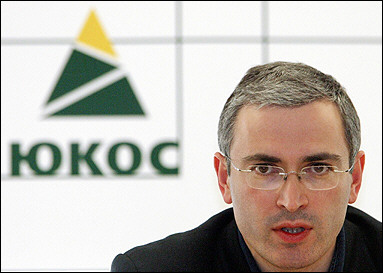
Arguably the leading figurehead of Russia’s recently stabilizing business community, oil tycoon Mikhail Khodorkovsky, was hauled into custody over the weekend, leading to a virtual crash in stock market investments and equity holdings there on Monday. Here’s an excerpt from the Washington Post article:
- As investors rushed to sell Russian holdings, financial regulators tried to stem the tide by suspending trading, and President Vladimir Putin disavowed any plan for a broad revision of the 1990s privatization of state assets. But he defended Khodorkovsky's arrest and said there would be "no bargaining" with the imprisoned billionaire. "I proceed from the assumption that the court had good reasons to take this decision," Putin said at a televised cabinet meeting at midday during the worst of the sell-off. He depicted the Kremlin as removed from the arrest, a view that is widely disputed among Russians. Putin's reassurance that a more expansive campaign against business is not planned appeared to mollify some investors. The benchmark RTS index fell 14 percent by late afternoon before partially recovering to close down 10 percent.
Khodorkovsky, head of the newly merged YukosSibneft , now the world's fourth-largest private oil producer, was arrested on Saturday in Siberia by masked commandos who stormed his private plane. He was charged with tax evasion, fraud and embezzlement and sent to the overcrowded Matrosskaya Tishina prison in Moscow until Dec. 30. His spokesman has dismissed the charges as unfounded and politically motivated.
Khodorkovsky, 40, whose estimated $8 billion fortune makes him Russia's richest man, was transferred Monday to a more comfortable cell with a television and refrigerator in a detention center where the hard-liners who tried to overthrow the Soviet Union's last leader, Mikhail Gorbachev, in 1991 were kept. But Khodorkovsky's Russian attorney was not allowed to see him.
"This is a case that's about the trampling of the constitutional and procedural rights in Moscow throughout the course of the investigation against Mr. Khodorkovsky," Sanford Saunders, a U.S. attorney for Khodorkovsky, said by telephone after holding a news conference in Washington to denounce the arrest. "This appears to be politically motivated and a fight for the future of Russia."
Nonetheless, the case -- seen by many political and corporate figures as a Kremlin campaign to destroy a rival power who has contributed funds to opposition parties -- threatens to sideswipe Russia's racing economy, just as it has finally recovered from the 1998 crash. Capital flight has resumed in the months since the Yukos investigations became public this summer, and some analysts say they believe the arrest has sabotaged a potential multibillion-dollar partnership between YukosSibneft and the U.S. oil company ExxonMobil.
"Khodorkovsky's arrest has become a sign, a watershed which may have serious impact on the business climate in Russia," said Yevgeny Yasin, a former economics minister who now heads Moscow's Higher School of Economics. "Putin says we mustn't generalize, we mustn't be in hysterics, that nothing threatens big business. I would agree with him if I didn't see that the authorities are breaking the law themselves."
Brokers said Russia is entering a period of "market unease," as one put it, that could last through the December parliamentary elections and Putin's widely predicted reelection next March, upsetting the political stability that Putin had fostered.
"I'm having a hard time thinking of a good outcome," said Charles Ryan, chairman of United Financial Group, a Moscow brokerage.
"Forget the oil price," he said, referring to high world prices that have buoyed Russia's economy by increasing revenue from oil sales abroad. "The largest contributor to . . . growth in recent years has been stability and the confidence that has led to investment. So by trying to bring these guys to book, he could undermine the very stability that has been the underpinning of his success."
Other brokers put a more optimistic face on it, recalling that the market recovered strongly after initially dropping when Khodorkovsky's partner, Platon Lebedev, was arrested in July.
Christopher Weafer, chief strategist at Alfa Bank, a large Russian institution, said Putin's remarks Monday helped reassure jittery investors. "People were waiting for a very clear statement from Putin that this is not going to extend to other companies, that this is not the start of a campaign against oligarch-type companies. And they got that." Khodorkovsky and other top business leaders are known as oligarchs.
The oil sector took the biggest hit in the markets Monday, particularly Yukos and Sibneft, which still trade separately. Yukos fell 19 percent after markets opened, prompting the RTS to suspend trading of the company's shares for an hour. The MICEX suspended trading of all stocks for an hour after an early plunge. Yukos finished the day down 15 percent, and shares of Sibneft were 20 percent lower, wiping out a cumulative $8 billion of market value.
While Khodorkovsky waited in prison, another partner, Vasily Shakhnovsky, who was charged this month with tax evasion, sought legal refuge Monday by joining the Federation Council, the upper house of parliament. The appointment could give him some immunity from prosecution if confirmed. Shakhnovsky won the surprise appointment from legislators in the northern region of Evenkia, where the governor is a former Yukos vice president.
"It isn't absolute immunity, but it should give him political weight," said Nikolai Petrov, a political analyst at the Carnegie Moscow Center. "It's a way of showing they are attacking a politician rather than a Yukos official."
So it seems the relatively stable situation that had arisen recently in Russia's economy might be at risk. Let's hope that cooler heads will soon prevail.
- Arik
UPDATE: Thursday 30 October - the Kremlin froze 44 percent of Yukos' capital shares to prevent Khodorkovsky and his oligarch pals from cashing in on their investment - prompting another slide in the RTS today, as well as speculation about a frigid authoritarian trend taking over the Russian economy just as investors were beginning to warm up to the country's opportunities.
October 26, 2003
Field of Dreams: Cubs vs. Red Sox World Series Could Have Revitalized Baseball

Now that all this baseball business is finally over with, I can say with confidence that the 2003 World Series was the most anticlimactic I can recall; that is, compared to the postseason playoffs, rich with the hopes of a Cubs against Red Sox contest that could have revitalized baseball as we know it. This is the chief reason I’m not a baseball fan – at least not during the regular season... all the drama and story are tied up in the unlikeliest (and most romantic) of possible scenarios.
I still think the Chicago and Boston teams should’ve played for third place – it certainly would’ve commanded higher ratings than the Series did, whether MLB sanctioned it or not. Oh well – maybe next season. In the meantime, I have a few great links that looks at the history of this story from NPR’s "Talk of the Nation", as well as thoughts from Slate by a Red Sox fan and what a Chicago win would've done to him. Finally, the tally on television ratings – third-lowest ever!
- Arik
October 22, 2003
SCIP European Conference in London
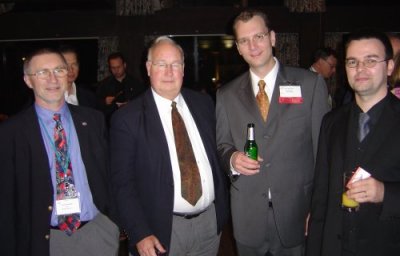
I flew in from Prague Wednesday morning to London Stansted to pinch-hit an afternoon pre-conference workshop at the SCIP European Conference in London, I’m second from right in the photo above enjoying a cocktail with friends the evening of the workshop, held at the London’s Thistle Tower Hotel – across the street from Tower of London, adjacent to Tower Bridge. Although I’d only intended to man Aurora’s booth at exhibits, I’d gotten a call from SCIP the prior Saturday as I was home from Silicon Valley for a few hours – enough time to repack before leaving for Prague that same day – asking if I’d be willing and able to help out and fill a recent speaker cancellation that’d opened up for the half-day afternoon pre-conference workshop Wednesday afternoon.
My first question was, "what will I be speaking about" and the topic, "Getting CI Customers Excited About Intelligence" (click the title to download the PowerPoint deck), seemed soft enough that I shouldn’t have a problem. So, Michael Reed at SCIP was kind enough to ask Melanie Wing (these slides are really hers, with a few additions) to ship me her slides, and Emily Gower was nice enough to tweak them out – THANKS GUYS! I couldn’t have done it without that help, only having a couple of hours altogether to contribute to finishing a three hour workshop. Emily, along with Andrew Minton, were also great help in the workshop itself – Emily serving as scribe and both of them provocateurs to give the European perspective on the subject – something really noticeable in the differences between the way North American and European CI practitioners evangelize themselves and their services across the enterprise.
Thanks all for a great time in London! See you all in Boston in March, hopefully!
- Arik
October 21, 2003
SCIP-Prague Chapter Half-Day Conference in Prague
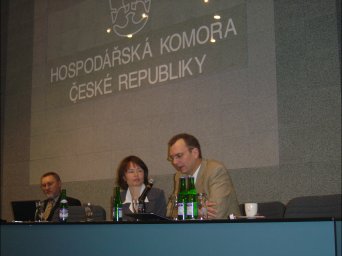
I arrived in Prague on Sunday, toured the city and mostly relaxed Monday before today (Tuesday) meeting up with Mr. Tomas Vejlupek from Tovek and Yitka, one of his staffers (and a great Czech-English translator, as seen in the photo above) for a Chamber of Commerce event produced by the local SCIP Chapter, for which Tomas serves as Chapter Coordinator. Not much to report here other than that – sorry, guys… most of the event was in Czech, so I had a hard time following – but here are the slides from my PPT deck if you’d like to have a look at what I talked about, "SCIP: Strategy, Structure & Intelligence Leadership".
Meeting Tomas and my brother Derek in London tomorrow – so, cheers to Prague and thanks for all the Pilsner Urquell!
- Arik
October 16, 2003
KMWorld & Intranets 2003 in Santa Clara

Although I’ve been in Silicon Valley for a few days doing meetings, I’ve tried to spend a little more time at the KMWorld & Intranets conference presentations over the past few days. Finally today, I gave a two presentations of my own (click the links to download the presentations): first,
"Competitive Intelligence Weblogs: Building Market Monitoring Capabilities with Rapid Analysis Tools"; and,
"Six Killer Intelligence Tools for Salesforce Support & Success".
See you next fall for KMWorld ‘04 or, hopefully earlier, at the KnowledgeNets conference InfoToday puts on in Manhattan in the spring. Oh, and, FYI – I’m off to Prague on Saturday, then London for the rest of next week, so not much blogging going on while abroad – it’s that busy travel season for me – but will try and catch up when I return the following week and will get a newsletter on the wire as well.
Cheers!
- Arik
October 10, 2003
No Lawsuit for Grad Student Author of CD Copy Protection Paper
 SunnComm, the company behind the MediaMax CD3 copy-prevention system, decided not to sue Princeton grad student John Halderman after all in civil court under the Digital Millenium Copyright Act, after Halderman published a paper describing how simple it was to defeat, as applied by BMG on the Anthony Hamilton CD he'd released last month. The paper concluded that "most users who would be affected can bypass the system entirely by holding the Shift key every time they insert the CD," an action that prevents the MediaMax drivers from loading. Here’s another excerpt:
SunnComm, the company behind the MediaMax CD3 copy-prevention system, decided not to sue Princeton grad student John Halderman after all in civil court under the Digital Millenium Copyright Act, after Halderman published a paper describing how simple it was to defeat, as applied by BMG on the Anthony Hamilton CD he'd released last month. The paper concluded that "most users who would be affected can bypass the system entirely by holding the Shift key every time they insert the CD," an action that prevents the MediaMax drivers from loading. Here’s another excerpt:
-
Since Halderman's paper appeared, SunnComm's shares have slipped precipitously, losing about $10 million in value. The company's stock appears on the Over-the-Counter Bulletin Board and was trading at 11 cents Friday morning.
Without giving specifics, SunnComm's original statement indicated that the company had planned to sue Halderman and claim libel or defamation in addition to the DMCA charges. "No matter what their credentials or rationale, it is wrong to use one's knowledge and the cover of academia to facilitate piracy and theft of digital property," the original statement said. "SunnComm is taking a stand here because we believe that those who own property, whether physical or digital, have the ultimate authority over how their property is used."
So, what's your verdict: is SunnComm a penny-stock with a worthless product that managed to dupe a few record execs into thinking they were the saviors of the record industry? Or were they really unjustly tested and smeared when an ambitious grad student decided to get famous on the back of the hot topic of CD piracy?
- Arik
October 09, 2003
In a Defeat for Big Telecom, Minnesota Federal Judge Says Hands-Off VoIP
 I noticed this story come out yesterday and was thankful my neighboring state has decided to lead by example - thus, perhaps, making it a little more certain the fate of my own VoIP service from Vonage. VoIP has been around for years, but usability and interoperability barriers with the traditional POTS system has made them a non-existent threat to big telephone companies until Vonage made a VoIP call seem a lot more like a regular phone call.
I noticed this story come out yesterday and was thankful my neighboring state has decided to lead by example - thus, perhaps, making it a little more certain the fate of my own VoIP service from Vonage. VoIP has been around for years, but usability and interoperability barriers with the traditional POTS system has made them a non-existent threat to big telephone companies until Vonage made a VoIP call seem a lot more like a regular phone call.
Naturally, the old hard-to-use VoIP services are still around - using essentially the same technology; they just aren't as much of a threat to the installed base of landline customers as Vonage has become - should we regulate IM providers like Yahoo, AOL and MSN, where VoIP is one option of their services?
"We're not suggesting that broadband telephony should never be regulated, but it can't be squeezed into existing regulation," Vonage Chief Financial Officer John Rego said in a recent interview. The link below provides some excellent competitive analysis of the situation - here're some excerpts:
-
Internet phone providers have won the first round in a clash with state regulators, providing needed momentum for the upstart industry.
In ruling from the bench late Tuesday, Minneapolis federal Judge Michael J. Davis permanently barred Minnesota from applying traditional telephone rules to Vonage, a pioneer in technology that lets consumers bypass the traditional phone network by making voice calls over a broadband connection. A written order that explains that the court's rationale is expected by Friday, according to the Minneapolis court clerk's office.
Minnesota Public Utilities Commission (PUC) analyst Stuart Mitchell said Wednesday that for now, the state plans to comply with the court decision and could conclude its proceedings against Vonage as early as Thursday, when the agency is next scheduled to meet.
"We've been told to stop, so we won't be enforcing our order," Mitchell said in an interview Wednesday. "I don't think the commission wants to violate a federal order."
Tuesday's ruling for now frees Vonage to sell its Internet phone service in Minnesota without obtaining a telephone operator's license or paying fees to support 911 services. More importantly, the order is the first to address the authority of a state to oversee so-called voice over Internet Protocol (VoIP) providers and could thus impact efforts by other states to regulate the Net telephony providers.
State regulators had threatened to stall VoIP's growth by forcing providers to follow the same rules as do traditional phone companies. As a result, the Minnesota suit was being closely watched by VoIP industry executives, consumers and traditional phone companies.
In the end, it's clear that, if we're going to regulate VoIP like we do POTS, we need to overhaul the regulatory system for telecom services as a whole; and that's not something you'll see big telecom pushing to have happen either.
- Arik
October 08, 2003
Total Recall: Schwarzenegger Wins; Democrats & Davis Dealt a Surprisingly Strong Blow

Failing to resist the temptation for Monday-morning quarterbacking alongside a similar yearning to steer away from media hype, I’ve decided the competition over the Governor’s seat in California offers a few takeaways that would be worthwhile examining from a business strategy perspective…
… so, with that…
Bodybuilder-turned-actor-turned-Governor-elect, Arnold Schwarzenegger might be a political rookie, but he’ll get no honeymoon from California state Democrats as he deploys his considerable assets – largely extending from those of political advisor former Governor Pete Wilson, not to mention an economic team formerly headed by billionaire investor Warren Buffett (who fell out of favor after he said Californians should pay higher property taxes) – to the task of fixing the $8 billion California state budget deficit. And, he’s not going to help matters by rolling back the reinstated vehicle registration fees that contributed to his election – that’s a $4 billion added cost if he gets it passed!
But, he did get his mandate, capturing a million-plus more votes than runner-up Cruz Bustamante, whom he’ll now have to work as his Lieutenant Gov.. But, the reason I’m writing about this subject isn’t because it’s just hot news; it’s because the Schwarzenegger campaign took advantage of key strengths on his part, weaknesses on the part of competitors, and dynamics present in the “marketplace” in pulling off what could be called the biggest political surprise in recent memory.
Schwarzenegger was not only well-known, he is well-known as an “action hero” that, despite notable weaknesses in the area of recent accusations of sexual harassment, misconduct and general tawdriness that surfaced as Democrats started to get desperate, is thought of as a “fixer” than can get things done, albeit, primarily on the silver screen if somewhat less so in real life. Likewise, in an era of “politics of dissatisfaction” where we have been consistently disappointed by our political leaders and now seek to kick the bums out, the market was seeking action of a kind they could predict might overcome the general malaise that had seemed to settle over Sacramento. Schwarzenegger is the devil Californians know (or at least think they know) who can, it is believed, get things done; while Davis and Bustamante were just devils, in the eyes of the majority of voters yesterday.
The timing was impeccable and, in my opinion, I don’t foresee a replay of Minnesota’s experience with Arnold’s friend Jesse Ventura, who left a bad taste in the mouth of voters who brought him to office by his apparent disregard of political decorum. I think there’s far too much riding on success to let those lessons go unlearned and Schwarzenegger stands an even chance of being successful in the short term - and is a sure-thing for re-election if (and it’s a big if) he can fix the budget problems faced by his predecessor.
- Arik
October 01, 2003
"Don’t-Call-Us-We’ll-Call-You" List Now Law of the Land… Well, Sort Of...

When I was in college, I was a telemarketer for a while to earn extra money. I know - it's a shameful admission, but it's true. My mother always used to respond to telemarketers that called her with, "I'm not going to buy whatever it is you're selling, sonny, but good luck - I know it's hard work. My son used to do the same job."
Let me tell you, it's not easy to try and sell lawn care, cable television or a membership in your college alumni club to somebody trying to sit down to an evening meal - I know, from experience, in all three lines of product. But that line of work did provide me with honest employment at a time when a stagnating economy kept pushing back on my ability to finish my four years as an undergrad at UW-Madison... as I'm sure it does for countless others, most of whom are, I suspect, not nearly so temporary in their commitment to a career in telemarketing. I can think of worse jobs, but not many... Still, silver-lining worth considering: it paid well and it taught me how to sell - an education I now look back on with some gratitude.
Despite the fact that the Federal Trade Commission was questioned - and ultimately restricted - on its authority to develop the new law enforcing the federal "Do-Not-Call" list, it would appear that federal regulators are fighting the telemarketing industry's legal challenges every step of the way. All this just as Federal Communications Commission Chair Michael Powell commented that his agency, while hampered by court rulings that deny the FTC from sharing its data with the FCC, would press on to enforce do-not-call rules.
In a Washington Post article I found, we can see a recalcitrant telemarketing industry try to half-heartedly comply with the new rules; even as the FCC began to see the first 250 complaints materialize over the confusion caused by a 20 to 30 percent drop in the more than 100 million calls that would normally be made in a telemarketing day.
In an ironic twist of fate, Powell's FCC had to ask the Direct Marketing Association for an electronic copy of the list - something I'm sure the DMA was loathe to comply with and ultimately refused to do - following U.S. District Judge Edward Nottingham's ruling last week to block the FTC from sharing the list with the FCC itself. Powell also asked for a list of DMA members that had downloaded the DNC database - presumably for enforcement and penalty purposes on any infractors.
The stakes are high - violators could stand to be fined $11,000 for each number on the list they might call. And, over the first six months of the year, the daily complaint rate received by the FCC for telemarketing calls has averaged only between 35 and 40 per day, so the 250 complaints received in the first 24 hours of the new law could only be the start of something a lot bigger.
Despite the fact that the DMA says millions of telemarketing jobs will be sacrificed in the months ahead, should the DNC move forward, all I can say is, at least I didn't have to listen to any pitches for Disney cruises or switching my long-distance over dinner tonight. What do you think? Are we just putting people out of low-wage, boiler-room jobs that they're better off without, or are we instead freeing up the massive productivity that could be had from applying telemarketers to new, more important (and less annoying) work?
- Arik
 "Competitive Intelligence applies the principles of competition and lessons of intelligence to the need for enterprise awareness and predictability of market risk and opportunity. CI has the power to transform an enterprise from also-ran into real winners with agility enough to create and maintain sustainable competitive advantage."
"Competitive Intelligence applies the principles of competition and lessons of intelligence to the need for enterprise awareness and predictability of market risk and opportunity. CI has the power to transform an enterprise from also-ran into real winners with agility enough to create and maintain sustainable competitive advantage."
